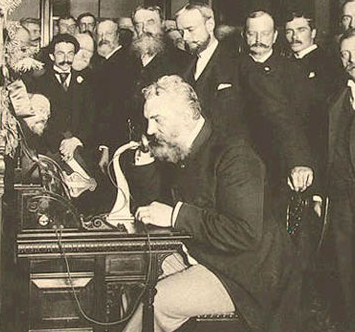The Full Duplex Press: My Gmail Phone
by Jane Hu

In Marshall McLuhan’s prophetic 1964 analysis, Understanding Media, he defines the telephone as “speech without walls.” At the end of the 19th century, the new postal system of telephone calls went beyond letters and telegrams to collapse the time and space between two distinct-and simultaneous-voices. Yet within the course of telephonic traffic, lines get jammed. We stare at phones with telepathic (if often futile) fervor, our eyes and mind willing it to ring. Our appetites for attention and news and scandal feed our wish for the phone to ring. As phones grow more digitized and versatile-and, sometimes, less versatile and less simultaneous-our dependence on them means we must continually readapt our roles as storytellers and listeners. Still, telephones may be the greatest symbol of modernity; the phone has never lost touch of our desire to stay in touch.
The telephone’s prominent place in film bespeaks its newness. The phone is to cinema what letters are to novels: a chance for separate plots and separate people to converge, entangle, and subsequently unravel in a drive toward narrative closure. While Hollywood cinema incorporates phones into storylines of unbelievable tightness, the narrative of real-life technology progress lacks this linearity. McLuhan calls it “one of the ironies of Western man that he has never felt any concern about invention as a threat to his way of life” [PDF]. Forever, we possess a childlike tendency to experiment first and worry later. Only in retrospect do we peer on our past with alarm, dissecting an already-lived trajectory into worrisome fragments. To periodically look back on telephonic history is to remember that phones are both tools of enchantment and efficiency; few things compare to the transmission of the human voice.
And what better time to begin with than now.
Google Voice, which launched March 11, 2009, joined Gmail this week to create a phone function in Gmail chat. Like Google Voice, this new application allows free calls across the United States and Canada. You can also screen calls and link your online account to all your other phones. The dialing process is straightforward and Gmail doesn’t require you to register a number to place calls, although you need one to receive them. Canadian residents do not have the latter option, although it’s said to be in the works. I tested my Gmail phone with one of the few numbers I know by heart-my mom’s-and we had, as far as sound is concerned, a clear conversation. (She did ask me to send her the link to this new online phone.)
Farhad Manjoo uses the new phone plugin to make an argument for the landline, which, he points out, still holds a central position in the household. Manjoo predicts that developments will occur in the form of landline phones, which might integrate with “your tablet computer, your digital music player, your TV, your stereo, and probably your toaster…Your contacts will move easily between all your devices, so you’ll never have to remember a phone number again.” The merging of the telephone with other technologies doesn’t limit our communication options to one landline, but diffuses them throughout the home and into online space. In time, too, we may simply become our landline; an identifying code that can route anywhere.
The Gmail phone further blurs the line between audio and written communication. Our modern-day epistolary instrument-the email account-can now also effortlessly transmit information through sound. If it’s a voicemail, sound can, in turn, be transcribed back into writing. Supposing Gmail later implements an automatic voice-to-text function on all calls, the potential for easier discourse between people with disabilities also expands. After all, Alexander Graham Bell and his father Melville Bell strove to render speech visible in order to improve conditions for the deaf; this project ultimately produced the telephone.
On the flip side, Peter Nowak warns that Google intends to collect voice samples through the online phone to build a better voice search system. Consider the ambiguous Google Voice privacy policy:
Google’s computers process the information in your messages for various purposes, including formatting and displaying the information to you, playing you your messages, backing up your messages, and other purposes relating to offering you Google Voice.
Given the textual mass generated by Google Books, it seems logical that a sound database is also in the works. And there’s something appropriately uncanny about voice archives that contain unwitting samples of everyday life.
My relationship with my Gmail account extends far deeper than that with my cell phone. Whereas I can turn off my phone and place it in a corner, I have a harder time ignoring the green “Call phone” icon that now sits atop my contact list. And, as far as I can see, it cannot be budged. As Wired’s Ryan Singel suggests, this added element only reinforces our dependency on Gmail and Google: “Google just gave users another reason to always be logged into Gmail and in turn, their Google accounts.”
If soon we lose even the string of numbers that separates our abstract phone-identity from our physical selves, the phone will, once again, increase its pervasiveness and omnipresence. More and more, we move ourselves into an apparatus-a communication armor, owned and provided by corporations-that can send and receive messages at all times.
